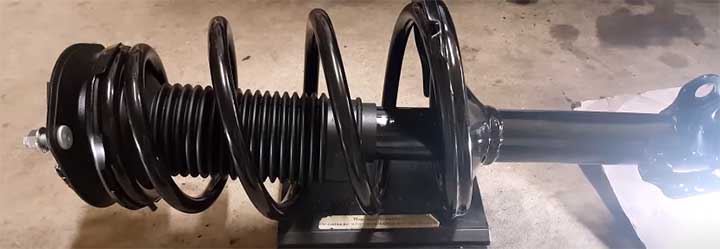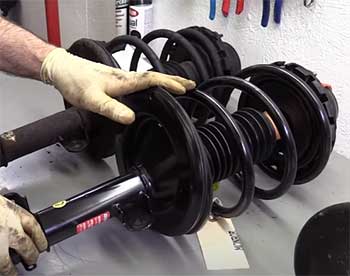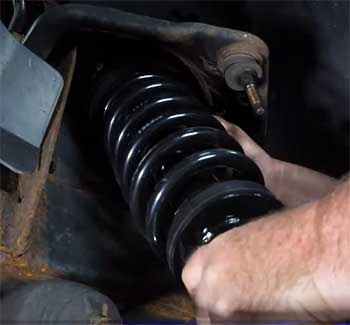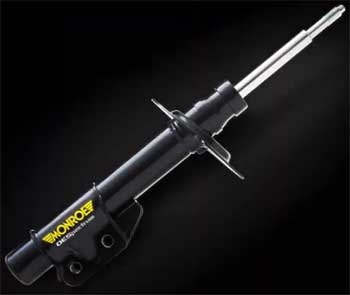If you’re in the market for new struts or shocks for your vehicle, you may be wondering how FCS and Monroe brands stack up. Both companies make reputable aftermarket suspension components, but they have some key differences.
This comprehensive guide examines the pros and cons of FCS vs Monroe struts to help you decide which is best for your needs.
A Brief Comparison Table
| Category | FCS | Monroe |
| Construction Quality | Decent welded steel housing, uses quality components. Strut tubes are thinner gauge steel. | Zinc-plated steel housing meeting OE standards. Robust monotube design on higher end models. |
| Ride Comfort | Very compliant, exceptional bump absorption for daily driving. | Smooth and cushioned but slightly firmer than FCS. Still rates as comfortable. |
| Handling Performance | Competent handling for routine driving but some body roll during aggressive maneuvers. | Responsive with good cornering capability. Balances comfort and control. |
| Product Range | Covers most common vehicles but not as exhaustive as Monroe fitment list. | Universal coverage for virtually every domestic and import vehicle. |
| Durability | Average 50-80k miles, can reach 100k+ with maintenance. | 80-100k typical service life. OE design boosts longevity. |
| Warranty | Limited lifetime warranty but requires upfront return shipping on failed parts. | Limited lifetime or 1-year coverage depending on product line. Also requires upfront return. |
| Customer Support | Email and web contact form only. Mixed reviews on responsiveness. | Phone, email, and web support with knowledgeable assistance. |
| Cost | Budget-friendly pricing, $60-$120 per strut on average. Good value. | Mid-range pricing from $80-$150 for most applications. |
Overview of FCS and Monroe

First, let’s look at some background on each brand.
FCS, which stands for Fabrication Control Systems, is a company that manufactures aftermarket suspension parts including struts, shocks, and coilover kits. They aim to provide high-quality components at an affordable price point. FCS was founded in 2000 and is based in California.
Monroe, on the other hand, is a well-known shock and strut brand that’s been around since 1916. They are an OEM supplier to many auto manufacturers. Monroe is currently owned by Tenneco, a large automotive parts supplier. Their shocks and struts are generally considered a mid-range offering – pricier than bargain brands but not as expensive as premium offerings.
Also Read: Differences Between FCS Struts And KYB Struts.
Key Differences Between FCS And Monroe Struts
So in a nutshell, FCS is a relative newcomer that focuses on value-oriented suspension upgrades, while Monroe is an established brand with a mainstream following. But how do they compare in terms of performance, durability, and overall value?
Let’s dig into the details.
- Construction Quality
A key consideration when choosing shocks or struts is the quality of materials and construction. Cheaper components may fail prematurely or provide inferior ride quality.
FCS struts feature welded steel housings and multi-stage zinc plating to prevent corrosion. They use quality components from reputable brands for valves, seals, and bearings. However, some users note FCS uses thinner steel for their strut tubes compared to competitors.
Monroe struts also feature zinc-plated steel construction. They often use gas-charged monotubes with velocity sensitive valving. This provides a smooth ride with good handling control. Monroe products typically have a robust build quality with some users reporting they last over 100,000 miles.
Verdict: Monroe wins for construction quality by a slight margin, with their monotube design and rigorous OEM testing requirements. But FCS still produces respectable components given their budget-friendly pricing.
- Ride Comfort

How shocks and struts dampen impacts affects the vehicle’s ride quality tremendously.
The ideal is a balance of absorptive compliance over small bumps yet controlled body motion.
FCS tunes their struts specifically for street use, prioritizing a soft compliant ride over razor sharp handling.
They utilize fluid flow valves that adapt to road conditions. The result is very good ride comfort that soaks up bumps and potholes.
Monroe also designs their products to deliver a cushioned ride. Their twin-tube shocks with special valving are made to filter out vibrations and impacts. Ride comfort may be a touch stiffer than FCS but still rates as smooth and compliant.
Verdict: It’s close but FCS struts edge out Monroe by providing a tad more cushy compliance for daily driving. FCS really focuses on ride quality for regular roads.
- Handling Performance
While ride comfort is crucial, you still want capable cornering and handling from your suspension. So let’s see how these brands compare.
The FCS struts use fluid flow valves calibrated for street driving, not track use. Their handling is responsive and surefooted, adept at routine maneuvers. High speed cornering induces some body roll as FCS favors ride quality over sharp reflexes. Overall, they deliver pleasing predictable handling for daily commutes.
Monroe struts are also designed for street use but some models have beefier stabilizers and tuned valving for extra control when cornering. Responsiveness is a touch sharper than FCS brand though not as razor focused as true performance struts. The trade-off is well-balanced handling for spirited everyday driving.
Verdict: Monroe rates higher for enthusiastic handling while still retaining a comfy ride. FCS prioritizes comfort over crisp cornering capability.
- Product Range

Having a wide range of direct-fit components for different vehicles is valuable.
More coverage means it’s easier to get the right parts.
FCS makes shock and strut assemblies for thousands of domestic and import cars, trucks, and SUVs.
However, their application list is not exhaustive, especially for older or rare vehicles.
Some enthusiasts also wish FCS offered more upgraded coilover kits for performance models.
One advantage of Monroe as a large OEM supplier is their vast catalog of components.
They make struts and shocks for just about every mainstream vehicle on the road. Monroe also has upgraded Reflex models for certain popular performance cars.
Verdict: Monroe wins this category thanks to their near universal fitment range as a major OE manufacturer. FCS covers most common vehicles but can’t match Monroe’s expansive application list.
Also Read: How Carquest And Monroe Struts Stack Up?
- Durability & Longevity
You don’t want to be replacing failed shocks or struts prematurely. Let’s examine how long these components typically last.
FCS struts feature multi-stage zinc coating and dust boots to resist corrosion and extend service life. Users report getting 50,000 to 80,000 miles from FCS struts on average. Some have lasted over 100,000 miles with proper maintenance. Overall durability is impressive given their budget price point.
Monroe shocks and struts are also designed to be long lasting. Their OE standards include rigorous endurance testing. Most users experience a service life of 80,000 to 100,000 miles. Monroe’s higher-end gas charged and monotube products are recognized as some of the longest lasting options out there.
Verdict: Monroe wins this category. Their quality standards often translate to shocks and struts that hold up for years. FCS components can also hit high mileages but Monroe rates best for durability.
- Warranty Coverage
A strong warranty provides peace of mind protection should components fail prematurely.
FCS provides a limited lifetime warranty on their struts and shocks. This covers defects in workmanship and materials. However, warranty service requires sending back the defective unit on your dime first before receiving any replacement parts.
Monroe offers a limited 1-year warranty up to 18,000 miles on their Quick-Strut assemblies. Other shocks and struts have a limited lifetime warranty similar to FCS but with more restrictions. Monroe also requires upfront return of failed parts for evaluation.
Verdict: The warranty coverage is fairly comparable though FCS provides lifetime protection on all their struts. Monroe’s coverage varies by product line. But both require you to front the costs of shipping failed parts back first.
- Customer Support

Helpful customer service is important if any warranty or product issues arise.
FCS provides customer support via email and their website’s contact form.
They don’t have phone support. Response times are typically 1-2 business days.
Feedback on their customer service is mixed, with some praising their responsiveness while others report delayed or unhelpful replies.
Monroe has phone, email, and web contact options. As a large company, hold times can be lengthy when calling.
Online support is handled promptly within 1 business day in most cases. Overall Monroe’s customer service has solid marks for knowledge and professionalism.
Verdict: Monroe takes the win for having more ways to get support and generally quicker, more informed responses thanks to their sizable team. FCS support is understaffed by comparison though still adequate.
- Cost Considerations
Lastly, let’s compare the pricing and value you can expect between these brands.
FCS struts are affordably priced, ranging from $60-$120 per unit for most applications. This makes them one of the most budget-friendly options in the aftermarket category while still offering fundamentally good quality. Their pricing undercuts most competitors by 20% to 40%. Great value is a selling point.
Monroe struts are positioned as a mid-tier brand and their pricing reflects this. Most Monroe Quick-Struts fall between $80-$150 per unit. More heavy duty gas and monotube models can cost over $200 each. What you pay brings greater durability and performance versus bargain brands.
Verdict: FCS wins for value shoppers given their pricing can significantly undercut Monroe and competitors. But Monroe still represents a fair value relative to premium strut producers.
Also Read: How Duralast And KYB Struts Stack Up?
Frequently Asked Questions (FAQ)
Yes, FCS manufactures decent quality struts considering their budget-friendly pricing. They use good construction and components to provide a comfortable ride. FCS struts are a major upgrade over tired stock struts. However, Monroe struts edge them out in areas like durability, handling performance, and warranty coverage.
FCS (Fabrication Control Systems) is the original manufacturer of FCS branded suspension components. Their factory is located in California. FCS makes shocks and struts to sell under their own brand.
Yes, Monroe is widely recognized as a leading manufacturer of replacement shocks and struts. Their original equipment engineering expertise translates into products that provide an ideal balance of smooth comfortable ride quality, capable handling, longevity, and value. Monroe struts are a great choice for most vehicles.
There are a few reputable brands that produce high-quality aftermarket strut assemblies:
1. Monroe Quick-Struts are widely considered the best overall thanks to their precise OE-quality engineering and monotube gas charged design.
2. KYB Excel-G struts also follow OE standards closely and deliver well-rounded performance.
3. Bilstein struts are positioned as a premium offering with gas pressure construction and digressive valving for added handling capabilities.
4. FCS and Gabriel struts compete as affordable options that still upgrade worn factory struts considerably.
So Monroe, KYB, and Bilstein are leading choices, with Monroe Quick-Struts offering the best blend of comfort, durability, and value in most cases. FCS and Gabriel provide budget-friendly bolt-on solutions. Carefully researching options for your specific vehicle is recommended to determine the ideal aftermarket strut.
Final Verdict: Monroe Edges Ahead Overall
Looking at all the categories, Monroe squeaks past FCS as the winner in this comparison. Their struts edge out FCS in the key areas of construction quality, handling performance, product range, longevity, and customer support.
Monroe pays close attention to OEM standards which shows in the well-rounded performance of their struts. They deliver an ideal balance of comfort, control, durability, and value.
However, FCS remains a smart budget choice that still provides good ride quality and capability. For drivers seeking basic bolt-on upgrades without breaking the bank, FCS struts are appealing. They just can’t match Monroe across the board when it comes to robustness and refinement.
In summary:
- Monroe is best for drivers who want optimal handling, comfort, and longevity. Their excellent OE-quality construction comes at a moderate price.
- FCS wins for value-conscious enthusiasts seeking very affordable improvements over stock. Their components deliver on basics but can’t match Monroe’s depth of engineering.
So carefully weigh your needs and budget when choosing. For most everyday vehicles, investing a little more in Monroe struts pays dividends thanks to their proven performance and durability.
But don’t count out FCS if you simply want a low-cost upgrade over worn-out stock struts. Either solution beats keeping sagging, bouncy original struts that compromise handling and ride quality.

